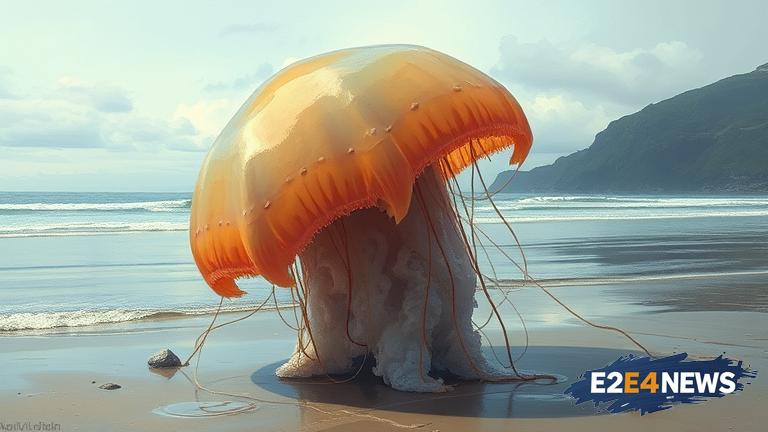In a bizarre incident that has left many stunned, a gigantic jellyfish, estimated to be the size of a paddling pool, has washed up on the shores of Scotland. The enormous creature, which has been described as an ‘alien beast’ due to its unusual appearance, was discovered by a group of beachgoers who were out for a stroll along the coast. The jellyfish, which is believed to be a species of lion’s mane jellyfish, is one of the largest to have been found in the UK in recent years. Measuring several feet in diameter, the creature’s massive size has sparked widespread interest and concern among locals and marine experts alike. While jellyfish are not uncommon in Scottish waters, the size of this particular specimen is highly unusual and has raised questions about the potential impact of climate change on marine life. The lion’s mane jellyfish is one of the largest jellyfish species in the world, with some specimens reaching up to 7 feet in diameter. However, it is rare to find them in UK waters, and even more unusual to find one of this size. The discovery of the giant jellyfish has also raised concerns about the potential risks it may pose to humans. While lion’s mane jellyfish are not typically aggressive, their sting can be painful and potentially dangerous. As a result, beachgoers are being warned to exercise caution when swimming or walking in the area. The incident has also highlighted the importance of monitoring marine life and the potential impacts of climate change on our oceans. As the planet continues to warm, it is likely that we will see more unusual and extreme weather events, as well as changes in the distribution and behavior of marine species. The discovery of the giant jellyfish is a reminder of the importance of protecting our oceans and the creatures that live in them. It is also a testament to the incredible diversity and complexity of marine life, and the many mysteries that still remain to be uncovered. As news of the giant jellyfish spreads, it is likely that the area will attract a significant amount of attention from scientists, researchers, and the general public. The incident is also likely to spark a wider debate about the importance of conservation and the need to protect our oceans from the impacts of climate change. In addition to the potential risks posed by the jellyfish, the discovery has also raised questions about the potential benefits of studying these creatures. Jellyfish have been on the planet for millions of years, and have evolved a range of unique and fascinating characteristics. By studying these creatures, scientists can gain a better understanding of the complex interactions between species and their environments, and can develop new insights into the potential impacts of climate change. The discovery of the giant jellyfish is a reminder that there is still much to be learned about the natural world, and that even in unexpected places, we can find remarkable and fascinating creatures. As the investigation into the giant jellyfish continues, it is likely that we will learn more about this incredible creature and the potential implications of its discovery. In the meantime, beachgoers are being warned to exercise caution and to respect the power and beauty of the ocean. The giant jellyfish is a reminder of the incredible diversity and complexity of marine life, and the many wonders that still remain to be discovered. With its massive size and unusual appearance, the creature is a testament to the awe-inspiring power of nature, and a reminder of the importance of protecting our oceans for future generations.
